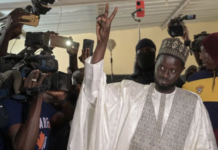“Britain demands that I give up my back talk and ‘know my place,’” sociologist Akwugo Emejulu tells me. “I’ve been told to shut up, directly or indirectly, more times than you would imagine. But how could I when there’s so much to be said, plainly and without artifice?”
In her work, Emejulu — a Black feminist scholar at the University of Warwick in England — provides us with an unfiltered look at the racism and oppression faced by Black British women across significant domains of unequal employment, housing and health care, especially within the context of COVID-19. She documents how Black women’s suffering is exponentially increased relative to such crises as austerity in the U.K. And Emejulu also discusses the shared global dimensions of anti-Black racism vis-à-vis Black women.
As a Black male philosopher with feminist commitments, I want to do what I can to draw more attention to the importance of Black feminist “back talk”: daring to disagree with hegemonic authority. I find that Black women’s voices are marked by an exhaustion that is unique and specific to their social locations, and yet their voices are relentless — conceptually amplifying the hegemony of anti-Black racism through their specific modes of what bell hooks calls “back talk.”
To explore the importance of Black feminist back talk, and to highlight Black feminist similarities and differences between different political geographies, I spoke with Emejulu, the author of Fugitive Feminism (Silver Press, 2021) and Minority Women and Austerity: Survival and Resistance in France and Britain (Policy Press, 2017), and the coauthor of To Exist is to Resist: Black Feminism in Europe (Pluto Press, 2019). Her research interests include the political sociology of race, class and gender, and women of color’s grassroots activism in Europe and the United States.
George Yancy: When I think about Black people throughout the Black diaspora, I think about a spirit of resistance, of refusal. This is one reason why I find cultural theorist bell hooks’s conceptualization of “back talk” to be so powerful. The expression is indicative of having a self-empowered perspective on the world. Back talk, for hooks, functions as a site of agency. In fact, she links the process of finding and honing one’s voice to processes of Black women’s liberation. She calls it “the liberated voice.” I take it that back talk is a key feature of Black feminist thought and practice. It is important, though, to be mindful of the social, historical and geographical specificity of Black women’s suffering, political struggles and expressed agency. In this way, Black women’s back talk isn’t rendered monolithic. Please speak to how Black women’s voices within the U.S. have impacted your own “back talk” as a Black woman in the U.K.
Akwugo Emejulu: I grew up in a household full of back talk. My mother and grandmother provided different kinds of role models for me about how to live a dignified life and be self-possessed. My grandmother had a steely, almost patrician air about her — she did not suffer fools and made that very plain to anyone she encountered.
My grandmother desegregated the public hospitals in Dallas, Texas, becoming the first Black nurse employed at Parkland Memorial Hospital (this is the hospital where President John F. Kennedy died after being shot by Lee Harvey Oswald in 1963). Living and thriving under Jim Crow meant that she couldn’t afford to be anything but true to herself and her own wishes and desires. Her sparkling self-confidence and charisma meant that she attracted a lot of people to her, but she always warned me to choose friends wisely.
One of her favorite aphorisms was: “Love many, trust few, always paddle your own canoe.” I took this to heart. I think growing up with my grandmother and coming to maturity during the civil rights movement, my mother consciously chose a different way to be a Black woman. More open and kind-hearted than my grandmother, my mother channeled her energy externally. As an English and French teacher working in one of the poorest neighborhoods in Dallas, she sought to fire up her Black students’ imaginations, helping them envision other lives and other wonders for themselves through literature. In her classes, before the violence of standardized testing, she read Toni Morrison, Richard Wright, Ralph Ellison and William Faulkner with her students and helped many of them, materially and emotionally, build different kinds of futures for themselves.
Given this upbringing, I really had no choice but to be who I am now. As a Black American living in the U.K., my back talk has constantly gotten me into trouble. I think most Americans living here are genuinely surprised by how repressed and passive aggressive most people are here. Nobody says what they really mean. Everything is coded and said indirectly. For years and years, I truly did not understand what anybody was saying to me. I’d have conversations with colleagues and later on realize that we were in a dispute — but there were no harsh voices or angry tones — just a look and a raised eyebrow. I think Sally Rooney’s Normal People and Kazuo Ishiguro’s The Remains of the Day are the best representations of this particularly British and Irish repression. Anyway, because Britain is a deeply hierarchical society, riddled with class anxieties (and in England in particular, racial panic), as an outsider I had to learn how to navigate these complexities. Britain demands that I give up my back talk and “know my place.” I’ve been told to shut up, directly or indirectly, more times than you would imagine. But how could I when there’s so much to be said, plainly and without artifice?
I like your insistence here. This is also what I like about bell hooks. There is that courage to engage in frank speech. To further avoid the problem of erasing important differences, how would you characterize the oppressive experiences of Black women in the U.K. and, by extension, what are some of the differing ways that Black women’s voices in the U.K. speak critically to their lived specificity of oppression? Of course, I’m also keeping in mind that the U.K. isn’t the whole of Europe.
I’ll start by acknowledging the problem of a Black American woman speaking on behalf of Black British women. This remains a real source of tension between some high-profile Black American women living in the U.K. — such as myself — and various Black British activists. And this tension about who speaks, and who gets listened to and taken seriously probably best sums up the material and discursive inequalities that Black women experience here — that of erasure. Black women are more likely to be living in poverty, working in low-skilled, low-paid work and more likely to be in precarious employment, regardless of class. Black women must navigate, what we call here, both a gender and ethnic penalty in the labor market, which means that they must contend with a gender and ethnic pay gap as well as gendered and racialized labor market segregation and discrimination. It’s a double hit to earnings, wealth accumulation, career progression and pension savings. Being trapped in low-paid work, as we know, has all kinds of knock-on effects with regards to housing and health. Indeed, a new report by Bloomberg demonstrated how Black households in London — where almost 60 percent of all Black Britons live — have been almost totally shut out of the housing market, meaning there’s little possibility of living in secure housing nor building generational wealth through bricks and mortar. Further still, we see already existing health inequalities exacerbated by the COVID emergency. Because Black British women are over-concentrated in low-paid work, they have been less able to protect themselves from infection. Being a briefly honored essential worker hasn’t really meant much beyond high levels of exposure to the virus and a huge number of COVID deaths. Truly, this is a catastrophe.
In my own work, which examines how women of color activists organize against austerity, my colleague Leah Bassel and I found that because Black women were already in a state of almost permanent precarity before the 2008 economic crisis, austerity measures — tax increases and cuts to public spending — have hit this group even harder. The rollback of the welfare state — from library and community center closures to benefit cuts to loss of government employment — have all had a deleterious effect on Black women’s income, wealth and health. However, in Britain, we are still in the middle of a decades-long debate about how the “white working class” has been left behind and has, in response, abandoned the socialist and social democratic left for the center and far right. At no time, whether it’s been public intellectuals chattering about the “left behind” nor about the racial disparities in COVID deaths, have Black women prominently featured in these public debates or policy interventions. Instead, Black economic insecurity and Black death are treated as taken-for-granted and routine. This is what erasure looks like. As both you and Charles W. Mills remind us, the racialized social order is maintained through an active state of violent ignorance and acceptance of the way things are.
Thank you for bringing these realities to our attention. They confirm, for me, the often unknown or unspoken (at least from within the U.S.) ways in which Black women in the U.K. suffer from institutionalized forms of anti-Black racism and face forms of precarity and erasure. Raising a different form of erasure, as a Black male academic, I have taught within predominantly white institutions. As a Black male philosopher, however, the presence of white faces only increases. So, I know what it is like to in teach within a sea of whiteness. Black women philosophers, of course, would have a different set of experiences owing to their intersectionality in terms of being in a sea of maleness and whiteness. And while the number of Black philosophers in the U.S. is still significantly low, the U.S. has more Black academics than the U.K. Two questions: As you see it, what are some of the factors for such low numbers in the U.K.? And what is it like teaching as a Black woman, which no doubt raises all sorts of intersectional dynamics, within such white spaces, especially as you teach Black feminism? I’m tempted to say, “Black feminisms.”
It’s no mystery as to why we see so few Black academics in British higher education. For context, I am one of 25 Black women professors out of more than 21,000 professors across the whole of British higher education and the first ever in the history of my university. There is one Black woman professor, the brilliant scholar, Olivette Otele, in the discipline of history, and she was only promoted to full professor a few years ago. It’s a scandal. But it’s a scandal that has been designed into the education system. Generally speaking, in England, Black pupils leave school with similar qualifications as their white counterparts. In Scotland, pupils of color are more likely to have better qualifications than their white peers. However, in both England and Scotland, Black pupils are less likely to be admitted to the best universities, which are collectively called “the Russell Group” here in the U.K. So, Black pupils are already at a disadvantage of being shut out of this small group of elite universities where the vast majority of our leaders are incubated.
Even those few Black pupils who do manage to gain entrance to the Russell Group, they must navigate a hostile and alienating environment in the classroom and in student halls. Time and again, we see stories of hideous racism, sexism and classism at these universities. The final blow comes in terms of degree classification. Black students are less likely to leave university with top honors — what we call first-class honors, a first, or even an upper-second class honors, a “2:1.” Across the Russell Group, we see the same patterns repeat: Black pupils do well enough to be admitted to these top flight universities but then something happens whilst they are at university which means that they do not graduate with the best marks.
You can see how this situation then has a knock-on effect in terms of developing the next generation of Black scholars. Without those top marks — and sadly, the imprimatur of the Russell Group — it means Black students are less likely to win prestigious studentships (scholarships) for their masters and doctoral work. This is sometimes called a “pipeline problem,” and there have been some half-hearted attempts in my disciplines of political science and sociology to address this, but really, by the time students get to university, many of these dynamics that erode success are already in motion.
As for me, I love teaching — I get that from my mother. I saw firsthand how her teaching changed the lives of her students. I was also transformed by a few amazing professors during my university years, so I think I have a pretty good idea of what good teaching looks like. So, in that sense, I haven’t really ever struggled in the classroom because I have self-consciously honed and developed a particular kind of teaching persona. I try to take a very informal air in lectures and seminars with lots of jokes and asides. I think this is probably in response to being on the receiving end of so much bad teaching over the years, but it’s also because I think many academics think too highly of themselves and the classroom space. Yes, this is a space for learning, but it needn’t be alienating nor exclusive. We can still have high-minded discussions and I can break the tension by cracking a bad joke. I don’t know why this works for me. I’m sure other Black women academics wouldn’t be able to get away with this informal approach.
Further, having spent the vast majority of my academic career in Scotland, one of the whitest places on the planet, I almost never had Black students in my classroom during my 15 years there. This has changed since I’ve moved down to England, but it is still a little disorienting to me for sure. Having taught some permutation of feminist theory or gender studies for almost 20 years, to be quite frank, the current fashion of so-called “intersectional feminism” has been a boon to me. Before this, it was a struggle to teach feminism because most students were reflexively hostile to it and it was a challenge to get them to engage meaningfully with key ideas and concepts, unlike when I taught Marxism or post-structuralism.
For the past four years, I’ve been teaching a new module here at the University of Warwick called Feminist Pedagogy/Feminist Activism which is about the learning and education that takes place within feminist movements. I won’t lie; the first two years of teaching this module were a bit of a struggle because of some of the white students, self-proclaimed feminists, natch — were surprised and angered that Black feminism was the default, taken-for-granted position of the module, and that it was not treated as an almost forgotten add-on, as is usually the case in mainstream gender studies courses. Having to contend with an idea that gender is always classed and raced was very disconcerting for some students, and I don’t think they ever really reconciled themselves to it. Which is fine by me, as that pattern is writ large across the mainstream feminist movement too.
From what you’ve shared thus far, we must grapple with the deep political, social and affective sites of anti-Blackness in the U.K., and we must announce these to the world. Fannie Lou Hamer, who was a leading Black activist in the civil rights movement, is famously known to have said, “I am sick and tired of being sick and tired!” I think that this functions as a form of “back talk.” Hamer isn’t just stating a fact about being sick and tired. Rather, she is commenting on a form of exhaustion that speaks to being so exhausted. What Hamer says might be said to function as an affective tissue that describes what it means to be Black in the U.S. How would you theorize Hamer’s clarion call for Black people within the U.K.? Also, please speak to how the affective gravity of Hamer’s exhaustion speaks to a shared collective identity among Black women within the U.S. and the U.K.
My colleague Leah Bassel and I published a paper in 2020 called, “The Politics of Exhaustion,” which examines the processes by which women of color activists in Europe become exhausted and how, in some cases, exhaustion can be a source for new forms of solidarity. In short, our current circumstances demand extreme physical and psychological fatigue from Black women. Whether it’s the retreat of the welfare state, the normalization of the far right in mainstream politics or the ongoing deaths of refugees in the Mediterranean, the challenges are vast and allies are few.
The political situation in Europe is unstable and unrelenting. Since the start of the debt crisis (and, of course, much of this work predates 2008, but it’s the intensity of the work that has changed), Black women activists have been working hard on survival, self-help and mutual aid to stay alive. However, it is both impossible and unconscionable to allow activists to be in a state of high alert for more than a decade. But European countries have allowed this multifaceted emergency to continue, and now with COVID, there seems to be no end in sight.
These are exhausting circumstances which have sparked a mental health crisis amongst activists and is promoting many to burn out and leave the activist scene altogether. Further still, for those activists still working hard at the grassroots, they must contend with comrades who cannot be fully trusted because they perpetuate and reproduce racism, sexism, homophobia and transphobia in the ostensibly “radical” spaces of activist networks and coalitions. Those Black women activists who persist in these spaces must also contend with what we call “exhausting solidarity.” They must work together with activists who perpetuate harm because the outside threat is such that they cannot afford to work by themselves. These are the untenable conditions in which many activists across Europe are having to navigate and it is heartbreaking for me.
We also found that exhaustion can sometimes operate as a kind of collective identity/identifier. That if you look around and are sick and tired of how things are, that can be an important activation to get involved to try to make things better. So, exhaustion should be understood in a nuanced way. For sure it is a byword for fatigue and emotional distress, but it can also be a resource that can sometimes be mobilized to support activist work by building the ranks and helping to identify and analyze shared grievances.
Given the weight of this, where do we go from here? As I ask this question, I don’t want to leave “we” uncontested. Yet, Black people of African descent have had to deal with shared painful and brutal histories of slavery and colonialism. The dehumanization is there as well as the seemingly endless mourning caused by anti-Black racism. Our Black existence is held captive by anti-Black symbolic and structural forces. And yet we continue to resist, to exist despite forces of Black social death. It isn’t enough that Black unity is felt after the brutal murder of a Black body. And here I am thinking about the tragic killings of George Floyd and Breonna Taylor. How might we collectively imagine an empowered world, a more loving world, in which Black bodies matter, where finding it hard to breathe no longer exists?
You have unfortunately caught me in a gloomy mood about the future, but I will do my best to think positively for this final question. I return to the importance of community and connection. The activists of the Student Non-Violent Coordinating Committee called it the “beloved community.” I don’t think I ever believed that I would be living through bad times such as these. What makes it bearable, what allows me to breathe a bit easier, is my meaningful connection to others and our working together to make our little patch a wee bit better for everyone.
Especially in the U.K. context, we’ve been contending with closed opportunity structures for more than a decade and have seen living conditions worsen, especially for the most marginalized and vulnerable groups. To create possibilities for change requires diligent work locally to change political attitudes and political culture and build new forms of solidarity. This moment is so unstable; who knows what comes next, but what persists is our ability to hold each other close in pure connection.
This interview has been lightly edited for clarity and length.







